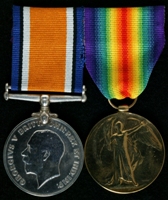

(L to R) British War Medal; Allied Victory Medal
We don't know anything about Joseph's early life. All we know about his family is that he had a brother named George.
The First World War broke out in August 1914 and Joseph joined a Territorial Force battalion of the Manchester Regiment during September. He enlisted in Ashton-under-Lyne, which suggests that he joined the 9th Battalion, who were based there, but we can't be sure of this. He was given the service number 2319.
We know very little about Joseph's war. He did not serve overseas until 1916 at the earliest. In March 1917 soldiers serving in Territorial units were given new service numbers. Joseph's was 350732. This tells us that he was serving in the 9th Battalion at that time. We don't know whether this was the 1/9th or the 2/9th Battalion.
At some point Joseph was transferred to the 1/5th Battalion. It is likely this happened in February 1918 during a reorganisation of the Army that aimed to have more soldiers in fewer battalions, rather than fewer soldiers in more battalions. The 1/9th and the 2/9th Battalions joined together, and around 210 surplus soldiers were sent to the 1/5th and 1/6th Battalions.
Joseph will have fought to stop the German Spring Offensive of March and April 1918, and then taken part in the Allied advances known as the Hundred Days Offensive. By this time the Germans were clearly losing the war, but they still put up stiff resistance and a great many British soldiers lost their lives. Joseph was one of these unfortunate men.
Joseph was killed in action on the 20th October during the capture of Belle Vue Farm, near the village of Briastre. We don't know how old he was. Joseph is buried in Belle Vue British Cemetery along with 131 other men. Most of them were also killed on that day, and over half were members of the Manchester Regiment. Joseph's grave reference is C. 20.
Joseph's medals were donated to the Museum of the Manchester Regiment in around 1952.




